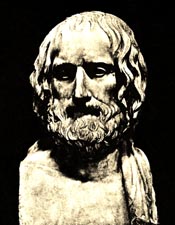Andromache
, translated by Theodoridis, G., (contributor-contact-email)
Euripides’ Athenian tragedy Andromache portrays the life of Hector’s widow, Andromache, during her enslavement by Neoptolemus following the Trojan War. Set years after Troy’s fall, the play focuses on Andromache’s struggles with Hermione, her master’s new wife. The exact date of its first staging is debated, ranging from 428 to 417 BC.
Andromache bears a child, Molossos, with Neoptolemus, who subsequently marries Hermione, daughter of Menelaus and Helen. When their union remained childless, Hermione’s jealousy towards Andromache and Molossos intensifies. In the play, Andromache, fearing for her and Molossos’ lives, seeks sanctuary at Thetis’ temple, hiding Molossos to protect him. The story unfolds with her at the altar, recounting her tragic past and current plight. Hermione confronts Andromache, accusing her of witchcraft and attempting to usurp her position. The arrival of Hermione’s father Menelaus, King of Sparta, raises the tension, as he has uncovered Molossos’ hiding place. Andromache allows herself to be led away, but is saved by the intervention of the aged Peleus, Neoptolemus’ grandfather. The plot is given a fresh twist with Orestes’ unexpected arrival and his abduction of Hermione, to whom he was previously betrothed. Orestes’ role as the architect of Neoptolemus’ subsequent murder at Delphi is revealed. The play concludes with Thetis’ divine intervention, foretelling the futures of the key characters.

Theodoridis, G.,
Support Open-Access:
Your contribution keeps our classical translations available to all. Every dollar helps support classics education and funds the expansion of our catalogue. Value what we do? Donate now.
File Downloads:
© Copyright, All Rights Reserved. This work may be freely reproduced, stored and transmitted, electronically or otherwise, for any non-commercial purpose. Conditions and Exceptions apply.